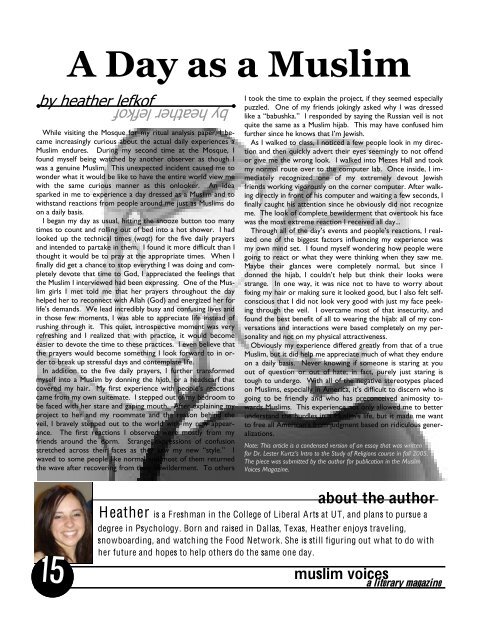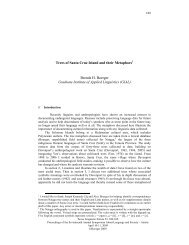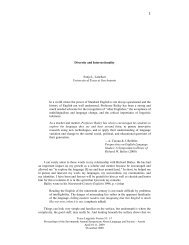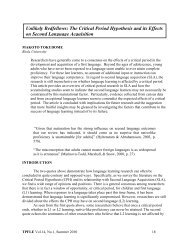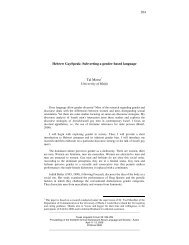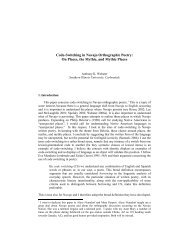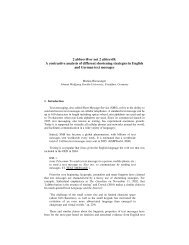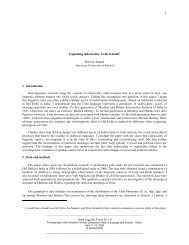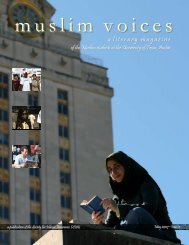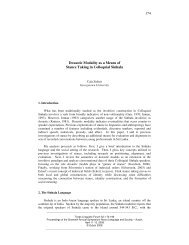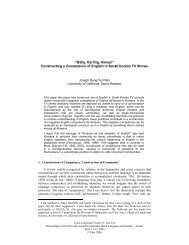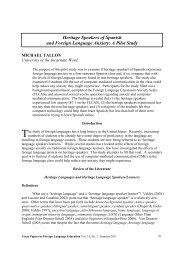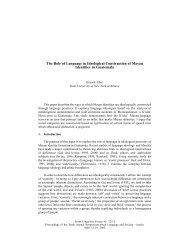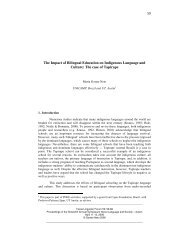m u s l i m v o i c e s - The University of Texas at Austin
m u s l i m v o i c e s - The University of Texas at Austin
m u s l i m v o i c e s - The University of Texas at Austin
Create successful ePaper yourself
Turn your PDF publications into a flip-book with our unique Google optimized e-Paper software.
y he<strong>at</strong>her lefk<strong>of</strong> by he<strong>at</strong>her lefk<strong>of</strong><br />
15<br />
A Day as a Muslim<br />
While visiting the Mosque for my ritual analysis paper, I became<br />
increasingly curious about the actual daily experiences a<br />
Muslim endures. During my second time <strong>at</strong> the Mosque, I<br />
found myself being w<strong>at</strong>ched by another observer as though I<br />
was a genuine Muslim. This unexpected incident caused me to<br />
wonder wh<strong>at</strong> it would be like to have the entire world view me<br />
with the same curious manner as this onlooker. An idea<br />
sparked in me to experience a day dressed as a Muslim and to<br />
withstand reactions from people around me just as Muslims do<br />
on a daily basis.<br />
I began my day as usual, hitting the snooze button too many<br />
times to count and rolling out <strong>of</strong> bed into a hot shower. I had<br />
looked up the technical times (waqt) for the five daily prayers<br />
and intended to partake in them. I found it more difficult than I<br />
thought it would be to pray <strong>at</strong> the appropri<strong>at</strong>e times. When I<br />
finally did get a chance to stop everything I was doing and completely<br />
devote th<strong>at</strong> time to God, I appreci<strong>at</strong>ed the feelings th<strong>at</strong><br />
the Muslim I interviewed had been expressing. One <strong>of</strong> the Muslim<br />
girls I met told me th<strong>at</strong> her prayers throughout the day<br />
helped her to reconnect with Allah (God) and energized her for<br />
life’s demands. We lead incredibly busy and confusing lives and<br />
in those few moments, I was able to appreci<strong>at</strong>e life instead <strong>of</strong><br />
rushing through it. This quiet, introspective moment was very<br />
refreshing and I realized th<strong>at</strong> with practice, it would become<br />
easier to devote the time to these practices. I even believe th<strong>at</strong><br />
the prayers would become something I look forward to in order<br />
to break up stressful days and contempl<strong>at</strong>e life.<br />
In addition to the five daily prayers, I further transformed<br />
myself into a Muslim by donning the hijab, or a headscarf th<strong>at</strong><br />
covered my hair. My first experience with people’s reactions<br />
came from my own suitem<strong>at</strong>e. I stepped out <strong>of</strong> my bedroom to<br />
be faced with her stare and gaping mouth. After explaining my<br />
project to her and my roomm<strong>at</strong>e and the reason behind the<br />
veil, I bravely stepped out to the world with my new appearance.<br />
<strong>The</strong> first reactions I observed were mostly from my<br />
friends around the dorm. Strange expressions <strong>of</strong> confusion<br />
stretched across their faces as they saw my new “style.” I<br />
waved to some people like normal and most <strong>of</strong> them returned<br />
the wave after recovering from their bewilderment. To others<br />
I took the time to explain the project, if they seemed especially<br />
puzzled. One <strong>of</strong> my friends jokingly asked why I was dressed<br />
like a “babushka.” I responded by saying the Russian veil is not<br />
quite the same as a Muslim hijab. This may have confused him<br />
further since he knows th<strong>at</strong> I’m Jewish.<br />
As I walked to class, I noticed a few people look in my direction<br />
and then quickly advert their eyes seemingly to not <strong>of</strong>fend<br />
or give me the wrong look. I walked into Mezes Hall and took<br />
my normal route over to the computer lab. Once inside, I immedi<strong>at</strong>ely<br />
recognized one <strong>of</strong> my extremely devout Jewish<br />
friends working vigorously on the corner computer. After walking<br />
directly in front <strong>of</strong> his computer and waiting a few seconds, I<br />
finally caught his <strong>at</strong>tention since he obviously did not recognize<br />
me. <strong>The</strong> look <strong>of</strong> complete bewilderment th<strong>at</strong> overtook his face<br />
was the most extreme reaction I received all day...<br />
Through all <strong>of</strong> the day’s events and people’s reactions, I realized<br />
one <strong>of</strong> the biggest factors influencing my experience was<br />
my own mind set. I found myself wondering how people were<br />
going to react or wh<strong>at</strong> they were thinking when they saw me.<br />
Maybe their glances were completely normal, but since I<br />
donned the hijab, I couldn’t help but think their looks were<br />
strange. In one way, it was nice not to have to worry about<br />
fixing my hair or making sure it looked good, but I also felt selfconscious<br />
th<strong>at</strong> I did not look very good with just my face peeking<br />
through the veil. I overcame most <strong>of</strong> th<strong>at</strong> insecurity, and<br />
found the best benefit <strong>of</strong> all to wearing the hijab: all <strong>of</strong> my convers<strong>at</strong>ions<br />
and interactions were based completely on my personality<br />
and not on my physical <strong>at</strong>tractiveness.<br />
Obviously my experience differed gre<strong>at</strong>ly from th<strong>at</strong> <strong>of</strong> a true<br />
Muslim, but it did help me appreci<strong>at</strong>e much <strong>of</strong> wh<strong>at</strong> they endure<br />
on a daily basis. Never knowing if someone is staring <strong>at</strong> you<br />
out <strong>of</strong> question or out <strong>of</strong> h<strong>at</strong>e; in fact, purely just staring is<br />
tough to undergo. With all <strong>of</strong> the neg<strong>at</strong>ive stereotypes placed<br />
on Muslims, especially in America, it’s difficult to discern who is<br />
going to be friendly and who has preconceived animosity towards<br />
Muslims. This experience not only allowed me to better<br />
understand the hurdles in a Muslim’s life, but it made me want<br />
to free all American’s from judgment based on ridiculous generaliz<strong>at</strong>ions.<br />
Note: This article is a condensed version <strong>of</strong> an essay th<strong>at</strong> was written<br />
for Dr. Lester Kurtz’s Intro to the Study <strong>of</strong> Religions course in fall 2005.<br />
<strong>The</strong> piece was submitted by the author for public<strong>at</strong>ion in the Muslim<br />
Voices Magazine.<br />
about the author<br />
He<strong>at</strong>her is a Freshman in the College <strong>of</strong> Liberal Arts <strong>at</strong> UT, and plans to pursue a<br />
degree in Psychology. Born and raised in Dallas, <strong>Texas</strong>, He<strong>at</strong>her enjoys traveling,<br />
snowboarding, and w<strong>at</strong>ching the Food Network. She is still figuring out wh<strong>at</strong> to do with<br />
her future and hopes to help others do the same one day.<br />
muslim voices<br />
a literary magazine


